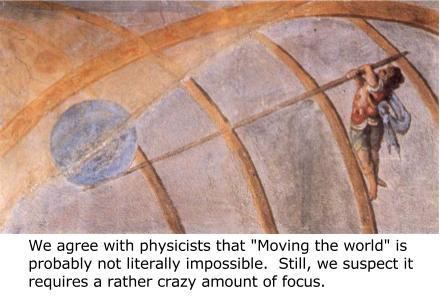A bit about our last few months:
- We’ve been working on getting a simple clear mission and an organization that actually works. We think of our goal as analogous to the transition that the old Singularity Institute underwent under Lukeprog (during which chaos was replaced by a simple, intelligible structure that made it easier to turn effort into forward motion).
- As part of that, we’ll need to find a way to be intelligible.
- This is the first of several blog posts aimed at causing our new form to be visible from outside. (If you're in the Bay Area, you can also come meet us at tonight's open house.) (We'll be talking more about the causes of this mission-change; the extent to which it is in fact a change, etc. in an upcoming post.)
-
We care a lot about AI Safety efforts in particular, and about otherwise increasing the odds that humanity reaches the stars.
-
Also, we[1] believe such efforts are bottlenecked more by our collective epistemology, than by the number of people who verbally endorse or act on "AI Safety", or any other "spreadable viewpoint" disconnected from its derivation.
-
Our aim is therefore to find ways of improving both individual thinking skill, and the modes of thinking and social fabric that allow people to think together. And to do this among the relatively small sets of people tackling existential risk.
Existential wins and AI safety
Who we’re focusing on, why
- AI and machine learning graduate students, researchers, project-managers, etc. who care; who can think; and who are interested in thinking better;
- Students and others affiliated with the “Effective Altruism” movement, who are looking to direct their careers in ways that can do the most good;
- Rationality geeks, who are interested in seriously working to understand how the heck thinking works when it works, and how to make it work even in domains as confusing as AI safety.
Brier-boosting, not Signal-boosting

- Further discussion of CFAR’s focus on AI safety, and the good things folks wanted from “cause neutrality”
- CFAR's mission statement (link post, linking to our website).
The ten up-votes you have for this post is a signal that either we shouldn't have a leader or if we should it would be difficult for him/her to overcome the opposition in the rationality movement to having a leader.
Speaking for myself (one of the upvotes), I think that having a single leader is bad, but having a relatively small group of leaders is good.
With one leader, it means anything they do or say (or did or said years or decades ago) becomes interpreted as "this is what the whole rationalist community is about". Also, I feel like focusing on one person too much could make others feel like followers, instead of striving to become stronger.
But if we have a small team of people who are highly respected by the community, and publicly acknowledge each othe... (read more)